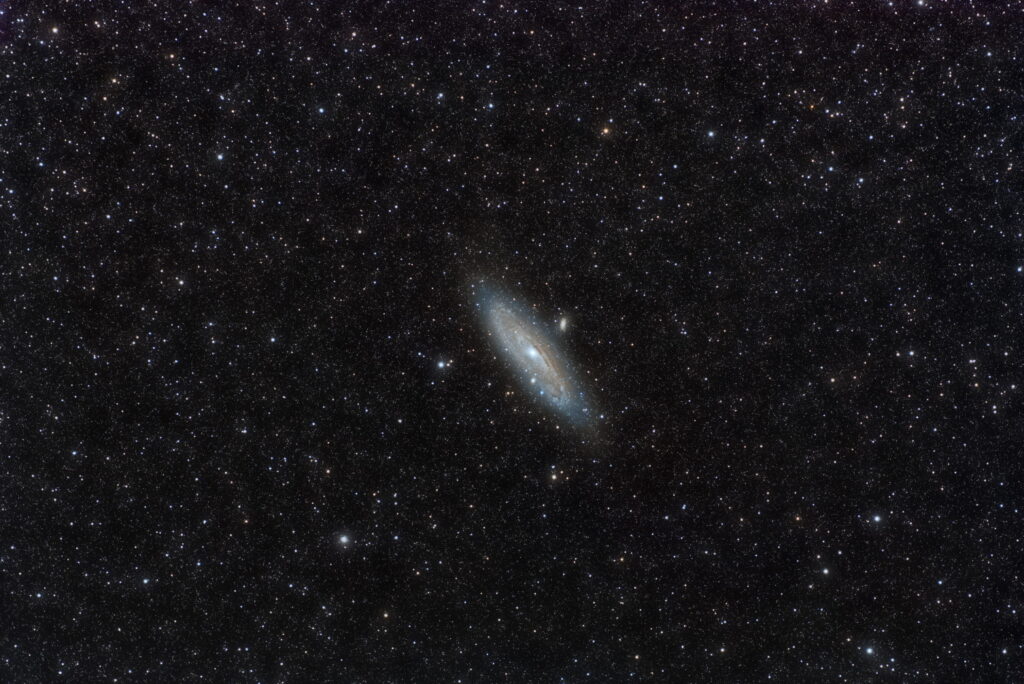As usual, between equipment issues and weather issues, I got much less than I expected. But it was a good time with friends from the club and I did get some images.

| Object | M 31, in the constellation Andromeda |
| Camera | dual Canon T6i, modified |
| Lens/Scope | Rokinon 85mm f/1.4 @ f/4 |
| Exposure | 55 x 3 minutes |
| Location | RAC Star Haven, Livingston Manor, NY |
| Processing | PixInsight |
I’ve shot constellation portraits using a 28mm lens (a “normal” lens on an APS-C sensor), and much longer at 250-400mm, but this is with the Rokinon 85mm f/1.4 which makes it a bit more fun to see an object “in context”, especially something large like M31.
I didn’t take pictures of the imaging rig, but I should have. The 55 sub-frames were taken with two different cameras simultaneously, mounted on a SkyWatcher AZ-GTi in equatorial mode, and untracked (equipment problems, I gave up on tracking). From my earlier post, you might realize that the individual frames had some issues, but the final result came out pretty good, especially when down-sampled for the web, like here.
The mount was set to dither, so the fixed-pattern noise that plagued my images from 2020 is gone. But in addition, using a second camera means there are two different patterns which further cleans it up. I also think that some of the aberrations from the lens that show up in a single frame get averaged out with the two camera setup, especially since the cameras are mounted in opposite orientations.
The cameras were dual-mounted on the SkyWatch AZ-GTi, but rotated on their sides. That means north was to the top of the frame in one, and to the bottom in the other. That probably makes no difference in the noise patterns, but… it also means that physical up is in opposite directions relative to the camera, so any lens droop in one camera is rotated 180° compared to the other. The stacking and rejection process might help there. Or maybe I’m fooling myself about the cause, but the aberrations seem absent in the final stack.
Written by Roland Roberts
Search
.Archives
- May 2025 (1)
- October 2024 (1)
- May 2024 (2)
- April 2024 (3)
- September 2022 (5)
- April 2022 (1)
- January 2022 (3)
- December 2021 (4)
- September 2021 (3)
- July 2021 (1)
- January 2021 (1)
- November 2020 (2)
- October 2020 (2)
- September 2020 (2)
- August 2020 (5)
- July 2020 (1)
- November 2019 (2)
- September 2019 (1)
- August 2019 (2)
- September 2017 (1)
- August 2017 (1)
- September 2015 (3)
- August 2015 (2)
- June 2015 (5)
- May 2015 (3)
- May 2013 (2)
- January 2013 (1)
- December 2012 (2)
- September 2012 (1)
- June 2012 (1)
- May 2012 (1)
- October 2011 (2)
- September 2011 (2)
- April 2011 (2)
- March 2011 (10)
- January 2011 (8)
- November 2010 (2)
- October 2010 (1)
- September 2010 (3)
- August 2010 (2)
- July 2010 (1)
- June 2010 (1)
- April 2010 (3)
- February 2010 (3)
- January 2010 (3)
- December 2009 (6)
- November 2009 (3)
- October 2009 (7)
- September 2009 (8)
- August 2009 (4)
- July 2009 (1)
- June 2009 (2)
- May 2009 (2)
- April 2009 (7)
- March 2009 (1)
- February 2009 (6)
- January 2009 (4)
- December 2008 (4)
- November 2008 (3)
- October 2008 (11)
- September 2008 (4)
- August 2008 (5)
- July 2008 (5)
- June 2008 (2)
- April 2008 (4)
- March 2008 (18)
- February 2008 (9)
- November 2007 (1)
- October 2007 (3)
- July 2007 (3)
- April 2007 (1)
- March 2007 (6)
- February 2007 (3)
- December 2006 (3)
- October 2006 (4)
- September 2006 (1)
- July 2006 (5)
- May 2006 (10)
- April 2006 (9)
